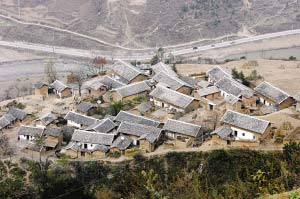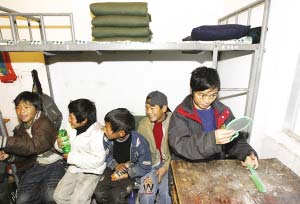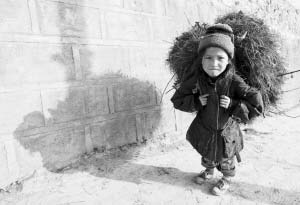Group 3 of isolated Dayingpan Village today has more than 20 lepers.
Dayingpan Village is a poor Yi ethnic village situated in indigent Yuexi County inside Sichuan Province. In January 1959, in order to control strains of lethal and contagious leprosy, the Yuexi government sent all lepers to what is now known as Dayingpan Village. Ever since then Dayingpan has been known as "leper village" or "ghost village".
Prejudice and misunderstanding have isolated Dayingpan villagers from the outside world for 40 years. Most of the lepers have never left their village ever since they settled down. Moreover, outside prejudice has inflicted great mental pressure on the descendants of these lepers. Although many of them have never contracted leprosy, their parent's tragedy has been passed on to them, making their lives and chances for study unfavorable.
8 pupils living in a dormitory. 72 pupils living far from Dayingpan Primary School live in dorms and return home on weekends.
Dayingpan villagers have no identification cards or birth certificates, making it unclear how many people actually live in this village. Locals there said over 1,000 people living in Dayingpan but no one could give a specific number.
Nearby residents called Dayingpan children "leper kids". Since 1959, the Dayingpan population has consistently expanded, thus changing the population structure. People outside of Dayingpan refuse to marry residents, causing much intermarriage in the village.
Dayingpan used to be a quarantine area meant to treat lepers. But currently it is isolating several hundreds of healthy people from the outside world. Nine hundred and forty normal people, confirmed as never infected with leprosy, still have no birth certificates and identification cards because they were born inside the "leper village". Consequently they have lost their right to work, or study outside of this village, as well as the right to move to other places.
In 2004, a charity group, the Wings of Hope, rebuilt Dayingpan Primary School, gaining Dayingpan children access to primary school education.
The Dayingpan Primary School was originally established in 1978. A total of 80 students had studied there before 2004.
Currently the Dayingpan Primary School has a three-story classroom building, a two-story dormitory, a canteen and a public bath. This is Dayingpan children's favorite place. They attend school free of charge and receive nutritious and delicious meals at no cost.
42 Dayingpan students of Xinmin Junior Middle School have to cross a mountain and the icy Yuexi River even during freezing winters because they are not allowed to board at this school.
Since 2005 Dayingpan pupils who graduated from the primary school could attend Xinmin Junior Middle School in town. But they were not allowed board at this school.
Because of this rule 42 junior middle school students must get up at about 5 AM and go to the Xinmin Junior Middle School by moonlight. They have to cross a mountain and wade across the cold Yuexi River. Usually it takes them two hours to get to Xinmin School. In the evening they return home via the same route.
Local disease control center data indicates that few descendants of lepers have been infected with the disease. All the students who attend the junior middle school have received strict medical checkups at the disease control center and have been issued health certificates.
Ashuowuguo, a third-grade pupil, 10 years old. She is one of the primary laborers in her family on weekends.
On weekends Dayingpan children have to do many heavy manual labor. Geqiliuniu, a fifth-grade student, has several household chores during the weekends. She feeds pigs, collects firewood and cooks dinners all day long.
Geqiliuniu has 5 sisters and brothers. Her 17-year-old sister is already married; she and her other two elder sisters are studying at the Dayingpan Primary School. Geqiliuniu also has a 5-year-old sister and 4-year-old brother. Her father works in a small mine in the nearby mountain and her mother works in the fields.
"Before they go to school, they must do household chores every day," Geqiliuniu's mother said. "The elder children look after the younger ones. We all must work very hard to feed so many mouths."
Sichuan Province is planning to invest 2 million yuan in order to build a Dayingpan Junior Middle School in 2008 so that more pupils can further their studies. The new school is expected to accommodate 300 students.
Poverty, large families, deep-seated unsanitary habits and terrible living conditions all compound the fundamental problems of leprosy in Dayingpan Village. Given the present situation, more thorough efforts are needed to completely defeat this disease.
(China.org.cn by Zhang Ming'ai, January 7, 2008)





